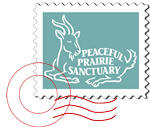 He felt almost cat-like, rubbing up against the back of my legs. And he followed me around the yard like a devoted dog. And like my cats and dogs, he even bumped his head up against my hand as he stood beside me, requesting that I pet him. And all this affection after only meeting that afternoon.
He felt almost cat-like, rubbing up against the back of my legs. And he followed me around the yard like a devoted dog. And like my cats and dogs, he even bumped his head up against my hand as he stood beside me, requesting that I pet him. And all this affection after only meeting that afternoon. As I walked around the grounds, I could tell he was still following me because I could hear his labored breathing. He was only a year old, but he wheezed and limped painfully because of his extreme overweight. No, he wasn’t a glutton, out of control of his appetite. His size was the result of genetic manipulation. I was told that he would probably die of a sudden heart attack before his second birthday.
I had never met a turkey in person before, except in cages at the State Fair. But I will never forget the day I spent with him and others like him at Peaceful Prairie Sanctuary, outside Denver. Like the other 300 million turkeys that are killed in the U.S. each year, my new friend had had part of his beak and some of his toes cut off when he was only hours old, without any anesthesia. He was conceived by artificial insemination, as all turkeys are these days, because mating is physically impossible. Human appetite for white meat has led to the genetic engineering of turkeys with huge breasts that make it impossible for them to get close enough to mate. They are also created to grow abnormally fast, as well as very large, leading to lameness and stress on their immature skeletons, hearts and lungs. Thus, the limping and wheezing of my special new friend as he tried to balance his over-sized body on his mutilated feet as he followed me affectionately around.
 We generally don’t think much about the centerpiece on our Thanksgiving table. If we think about the turkey as a real animal at all, it’s probably to assume that he doesn’t really have feelings or a personality. Certainly not the way our dogs and cats do. But after my experience at Peaceful Prairie Sanctuary, I know without a shadow of a doubt that isn’t true. Not only do these affectionate animals have personalities, but they wear their feelings where all can see them. The color of their heads changes from blue to pink and red as their emotions change.
We generally don’t think much about the centerpiece on our Thanksgiving table. If we think about the turkey as a real animal at all, it’s probably to assume that he doesn’t really have feelings or a personality. Certainly not the way our dogs and cats do. But after my experience at Peaceful Prairie Sanctuary, I know without a shadow of a doubt that isn’t true. Not only do these affectionate animals have personalities, but they wear their feelings where all can see them. The color of their heads changes from blue to pink and red as their emotions change.It used to bother me to hear people say, “Happy Turkey Day” instead of “Happy Thanksgiving.” I was saddened to think that we had lost the whole point of Thanksgiving, which is to remember to be grateful for all we have, and instead we have focused on stuffing ourselves as well as a turkey.
But now I have another idea. If we could truly celebrate Turkey Day, maybe it would be like celebrating Mother’s Day or Father’s Day or Veteran’s Day or President’s Day. We don’t eat our mothers, fathers, veterans, or president. We honor them, appreciating them for who they are and what they have done for us. We set aside a day to remember them, respect them, and be grateful for them.
I envision the day when we will look back upon the slaughter of 45 million turkeys for Thanksgiving alone – that’s 675 million pounds of animal flesh in one day – with regret. I’d like to think that when that day comes, we might have a real “Turkey Day” to honor the lives of these sensitive, affectionate beings that we harmed so much before we awakened to a reverence for all life. And when that day comes, not only will we have peace on our plates, but we’ll be on our way to peace in the world.
Delisa resides in Wasilla, Alaska and is cofounder of the Alaska Vegetarian Society
__________________________________________________________________________
Read more stories about the turkeys of Peaceful Prairie Sanctuary:
The Warmth Of Other Suns
Ian's Crossing
Sun Day
What We're Thankful For
__________________________________________________________________________
If living ethically is important to you, please remember that there is nothing humane about “humane” animal farming, just as there is nothing ethical or defensible about consuming its products. When confronted with the fundamental injustice inherent in all animal agriculture—a system that is predicated on inflicting massive, intentional and unnecessary suffering and death on billions of sentient individuals—the only ethical response is to strive to end it, by becoming vegan, not to regulate it by supporting “improved” methods of producing dairy, eggs, meat, wool, leather, silk, honey, and other animal products. For more information, please read The Humane Farming Myth. Live vegan and educate others to do the same.

<< Home